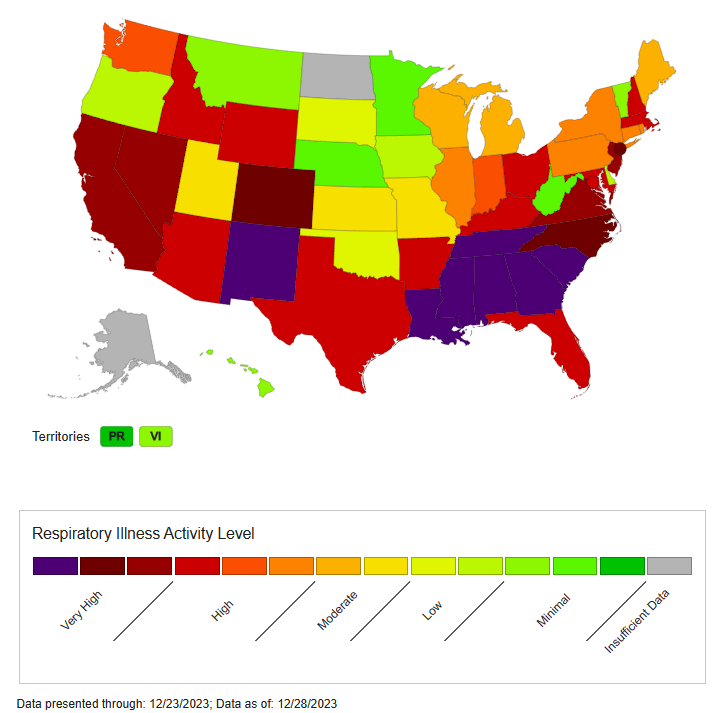You get a tissue, you get a tissue! What is the data on wintertime illness?
Your husband's home from work sick, the kids have a nasty cough, and you're fairly certain you heard the dog start to get the sniffles.
It seems like everybody is sick, but what does the data say?
How many people getting sick?
As of Dec. 29, data reported to the CDC reflected New Jersey at a level 11, or very high ranking, for respiratory illness activity levels.
The state is a hot point on the map, surrounded by states like New York and Pennsylvania ranking in as "high" and Delaware an outlier with a low level of activity.
These levels may continue to fluctuate as data is backfilled from the winter holidays, according to the CDC.

Respiratory illness reports have been on the rise in New Jersey since the beginning of November, but most recently they made a sharp jump in the makeup of emergency department visits, going from 4.3% the week ending Dec. 9 to 7.9% the week ending Dec. 23.
Those percentages are a combined total of visits associated with COVID-19, Influenza and RSV. COVID remained the frontrunner.
Nationally there has been a spike in positive flu tests, according to the CDC, making up 16.1% of tests for the week ending Dec. 23.
More: Snow in South Jersey this weekend? Here's what the latest forecast says
How long does COVID last? What are the COVID symptoms?
Coronavirus continues to be a respiratory concern, so what do you need to look out for?
Recent reports have shown that the length of COVID symptoms can vary from person to person and may show up differently depending on strains and variants.
Symptoms usually appear 2-14 days after exposure, according to the CDC, and can appear as the following:
Fever or chills
Cough
Shortness of breath or difficulty breathing
Fatigue
Muscle or body aches
Headache
New loss of taste or smell
Sore throat
Congestion or runny nose
Nausea or vomiting
Diarrhea
The CDC will continue to update its list of COVID symptoms as new strains and variants are studied.
What is RSV?
COVID and the flu may be household names when it comes to the wintertime influx of illness, but what about RSV?
Respiratory syncytial virus is yet another sick season illness to keep an eye out for.
While this is a common respiratory virus that usually only takes a couple of weeks to resolve, the CDC says that infants and older adults are at risk for severe RSV cases that may require hospitalization.
RSV vaccinations for adults 60 and older are typically available at local pharmacies.
More: Your fave pizza shop might be South Jersey's best, but you gotta tell us about it first
How to prevent illness
While you may not be able to opt out of the cold and flu season in its entirety, there are some things you can do to prevent yourself from getting sick.
The CDC recommends that you be careful about your contact with others and potentially germy surfaces. Avoid close contact with people who are sick and avoid touching your eyes, nose and mouth.
Masks can also help you protect yourself from respiratory illnesses like COVID-19 as the season progresses.
Wash your hands frequently, disinfect surfaces, and, most importantly, stay home if you're feeling sick.
Kaitlyn McCormick writes about trending issues and community news across South Jersey for the Courier Post, The Daily Journal and the Burlington County Times. If you have a story she should tell, email her at kmccormick@gannett.com. And subscribe to stay up to date on the news you need.
More: 12 South Jersey stories from 2023 and what happened after the headlines
More: Holidays, long weekends and every date you need to know for 2024
This article originally appeared on Cherry Hill Courier-Post: Flu, COVID, RSV. What is everyone sick with?

